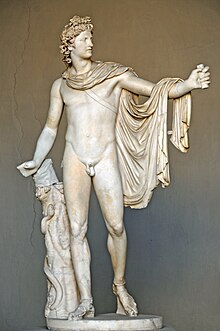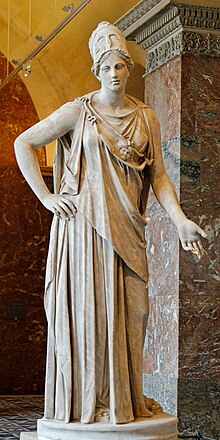ΓΙΑ ΕΛΛΑΔΑ ΓΙΝΕΤΑΙ ΚΑΙ ΑΝΤΙΚΑΒΟΛΗ Η ΚΑΤΑΘΕΣΗ/ΜΕΤΑΦΟΡΑ ΣΕ ΤΡΑΠΕΖΑ.
Επικοινωνήστε για λεπτομέρειες.
The item on the pictures is the one that you will receive.
Look carrefully and judge for your self for the quallity and the grade.
BID WITH CONFIDENCE.
.
SELLER with 100% POSITIVE FEEDBACK.
Apollo

Mercury[1] (antiquity)AnimalsRaven, swan, wolfSymbolLyre, laurel wreath, python, bow and arrows, swordTreelaurel, cypressDaySunday (hēmérā Apóllōnos)MountA chariot drawn by swansPersonal informationBornParentsZeus and LetoSiblingsArtemis (twin), Aeacus, Angelos, Aphrodite, Ares, Athena, Dionysus, Eileithyia, Enyo, Eris, Ersa, Hebe, Helen of Troy, Hephaestus, Heracles, Hermes, Minos, Pandia, Persephone, Perseus, Rhadamanthus, the Graces, the Horae, the Litae, the Muses, the MoiraiChildrenAsclepius, Aristaeus, Corybantes, Hymenaeus, Apollonis, Amphiaraus, Anius, Apis, Cycnus, Eurydice, Hector, Linus of Thrace, Lycomedes, Melaneus, Melite, Miletus, Mopsus, Oaxes, Oncius, Orpheus, Troilus, Phemonoe, Philammon, Tenerus, Trophonius, and various others
| Part of a series on |
| Ancient Greek religion |
|---|
 |
|
|
|
|
|
|
|
|
|
|
|
|
|
|
|
|
|
|
Apollo[a] is one of the Olympian deities in classical Greek and Roman religion and Greek and Roman mythology. The national divinity of the Greeks, Apollo has been recognized as a god of archery, music and dance, truth and prophecy, healing and diseases, the Sun and light, poetry, and more. One of the most important and complex of the Greek gods, he is the son of Zeus and Leto, and the twin brother of Artemis, goddess of the hunt. Seen as the most beautiful god and the ideal of the kouros (ephebe, or a beardless, athletic youth), Apollo is considered to be the most Greek of all the gods.[citation needed] Apollo is known in Greek-influenced Etruscan mythology as Apulu.[2]
As the patron deity of Delphi (Apollo Pythios), Apollo is an oracular god—the prophetic deity of the Delphic Oracle. Apollo is the god who affords help and wards off evil; various epithets call him the "averter of evil".
Medicine and healing are associated with Apollo, whether through the god himself or mediated through his son Asclepius. Apollo delivered people from epidemics, yet he is also a god who could bring ill-health and deadly plague with his arrows. The invention of archery itself is credited to Apollo and his sister Artemis. Apollo is usually described as carrying a silver or golden bow and a quiver of silver or golden arrows. Apollo's capacity to make youths grow is one of the best attested facets of his panhellenic cult persona. As a protector of the young (kourotrophos), Apollo is concerned with the health and education of children. He presided over their passage into adulthood. Long hair, which was the prerogative of boys, was cut at the coming of age (ephebeia) and dedicated to Apollo.
Apollo is an important pastoral deity, and was the patron of herdsmen and shepherds. Protection of herds, flocks and crops from diseases, pests and predators were his primary duties. On the other hand, Apollo also encouraged founding new towns and establishment of civil constitution. He is associated with dominion over colonists. He was the giver of laws, and his oracles were consulted before setting laws in a city.
As the god of mousike,[b]
Apollo presides over all music, songs, dance and poetry. He is the
inventor of string-music, and the frequent companion of the Muses,
functioning as their chorus leader in celebrations. The lyre is a common
attribute of Apollo. In Hellenistic times, especially during the 5th century BCE, as Apollo Helios he became identified among Greeks with Helios, the personification of the Sun.[3] In Latin texts, however, there was no conflation of Apollo with Sol among the classical Latin poets until 1st century CE.[4] Apollo and Helios/Sol remained separate beings in literary and mythological texts until the 5th century CE.
| Athena | |
|---|---|
Goddess of wisdom, handicraft, and war | |
 Mattei Athena at Louvre. Roman copy from the 1st century BC/AD after a Greek original of the 4th century BC, attributed to Cephisodotos or Euphranor. | |
| Abode | Mount Olympus |
| Symbol | Owls, olive trees, snakes, Aegis, armour, helmets, spears, Gorgoneion |
| Personal information | |
| Parents | In the Iliad: Zeus alone In Theogony: Zeus and Metis[a] |
| Siblings | Aeacus, Angelos, Aphrodite, Apollo, Ares, Artemis, Dionysus, Eileithyia, Enyo, Eris, Ersa, Hebe, Helen of Troy, Hephaestus, Heracles, Hermes, Minos, Pandia, Persephone, Perseus, Rhadamanthus, the Graces, the Horae, the Litae, the Muses, the Moirai |
| Children | No natural children, but Erichthonius of Athens was her adoptive son |
| Equivalents | |
| Roman equivalent | Minerva |
| Etruscan equivalent | Menrva |
| Canaanite equivalent | Anat[2] |
| Egyptian equivalent | Neith |
| Celtic equivalent | Sulis |
| Part of a series on |
| Ancient Greek religion |
|---|
 |
|
|
Athena[b] or Athene,[c] often given the epithet Pallas,[d] is an ancient Greek goddess associated with wisdom, handicraft, and warfare[3] who was later syncretized with the Roman goddess Minerva.[4] Athena was regarded as the patron and protectress of various cities across Greece, particularly the city of Athens, from which she most likely received her name.[5] She's usually shown in art wearing a helmet and holding a spear. Her major symbols include owls, olive trees, snakes, and the Gorgoneion.
From her origin as an Aegean palace goddess, Athena was closely associated with the city. She was known as Polias and Poliouchos (both derived from polis, meaning "city-state"), and her temples were usually located atop the fortified acropolis in the central part of the city. The Parthenon on the Athenian Acropolis is dedicated to her, along with numerous other temples and monuments. As the patron of craft and weaving, Athena was known as Ergane. She's also a warrior goddess, and was believed to lead soldiers into battle as Athena Promachos. Her main festival in Athens was the Panathenaia, which was celebrated during the month of Hekatombaion in midsummer and was the most important festival on the Athenian calendar.
In Greek mythology, Athena was believed to have been born from the head of her father Zeus. In the founding myth of Athens, Athena bested Poseidon in a competition over patronage of the city by creating the first olive tree. She's known as Athena Parthenos "Athena the Virgin," but in one archaic Attic myth, the god Hephaestus tried and failed to rape her, resulting in Gaia giving birth to Erichthonius, an important Athenian founding hero.
Athena was the patron goddess of heroic endeavor; she's believed to have aided the heroes Perseus, Heracles, Bellerophon, and Jason. Along with Aphrodite and Hera, Athena was one of the three goddesses whose feud resulted in the beginning of the Trojan War. She plays an active role in the Iliad, in which she assists the Achaeans and, in the Odyssey, she is the divine counselor to Odysseus.
In the later writings of the Roman poet Ovid, Athena was said to have competed against the mortal Arachne in a weaving competition, afterwards transforming Arachne into the first spider; Ovid also describes how she transformed Medusa into a Gorgon after witnessing her being raped by Poseidon in her temple. Since the Renaissance, Athena has become an international symbol of wisdom, the arts, and classical learning. Western artists and allegorists have often used Athena as a symbol of freedom and democracy.